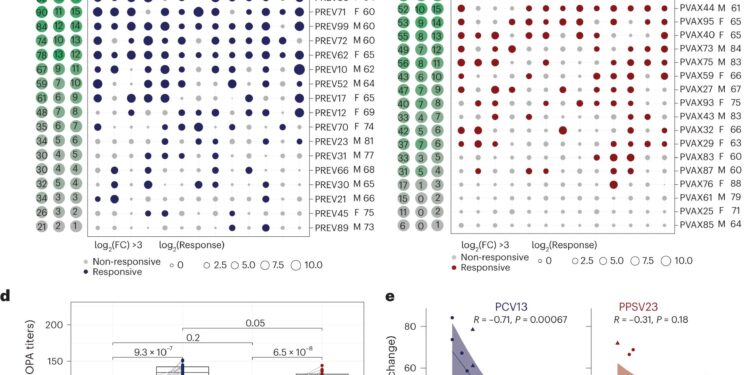Functional antibody response to PCV13 and PPSV23 in older adults. Credit: Natural immunology (2024). DOI: 10.1038/s41590-023-01717-5
An important aspect of aging is how the immune system changes over time. Such changes have consequences and contribute to increasing the risk of serious infections and other diseases such as cancer in the aging population. Researchers at The Jackson Laboratory (JAX) and UConn Health are rigorously studying why vaccines don’t work as well in some older adults.
Streptococcus pneumoniae is a dangerous bacterial pathogen that causes diseases such as pneumonia, meningitis and sepsis. Infants and the elderly are at greatest risk for pneumococcal infections, and case fatality rates increase with age for reasons that are still poorly understood.
Fortunately, several vaccines developed against the polysaccharides found on the surface of S. pneumoniae, including PPSV23 (Pneumovax), are generally effective in older adults, but not as protective as in younger adults. Combination (conjugation) of the polysaccharide with a protein, such as a non-toxic variant of a diphtheria toxin, may induce additional adaptive immune activation, resulting in enhanced protection.
The strategy has been used to develop a new class of FDA-approved conjugate vaccines (e.g., PCV13, Prevnar). Despite this progress, responses to pneumococcal vaccines still decline with age. Additionally, it remains unclear which of these two vaccines is preferable in elderly subpopulations.
To fill these knowledge gaps, a team led by JAX Associate Professor Duygu Ucar, Ph.D., UConn professor of health and director of the UConn Center on Aging George Kuchel, MD, CM, and Jacques Banchereau, Ph.D. (Immunoledge, Montclair, NJ), recruited and vaccinated a cohort of 39 healthy pneumococcal vaccine-naïve adults, all aged 60 years or older, to carefully compare pre- and post-vaccine immune characteristics .
Their results, presented in “Distinct baseline immune characteristics associated with responses to conjugated and unconjugated pneumococcal polysaccharide vaccines in older adults,” published in Natural immunology, identify the biological traits underlying the variable responses to the two different vaccines. Importantly, they also reveal distinct baseline (i.e., pre-vaccination) predictors that can potentially affect vaccination strategies and lead to more effective interventions, as they are more specific.
“Understanding who will respond strongly to which vaccine will provide us with opportunities to stratify the population to improve vaccine effectiveness at the population level, as well as understanding whether we can modulate the immune characteristics of individuals prior to vaccination to improve outcomes at the population level. individual,” says Ucar.
Efficiency indicators
All participants received a single dose of PPSV23 or PCV13 from May to early fall. Blood was collected before vaccination and one, 10, 28 and 60 days later to provide longitudinal data. After vaccination, researchers developed measures to quantify vaccine responses and rank donors based on their responsiveness within the cohort. Although overall responses to both vaccines were comparable, there were clear differences in baseline immune phenotypes, separating strong and weak responders.
The baseline abundance of two specific types of T cells, Th1 and Th17 cells, played an important role in responses to PCV13. Th1 cells produce molecular signals to activate early innate immune responses against pathogens, while Th17 cells also contribute to the defense response by producing a different group of inflammatory signaling molecules.
For PCV13 vaccine responses, higher levels of Th1 cells showed a positive association and higher levels of Th17 cells showed a negative association. Thus, a Th1/Th17 ratio before vaccination may be predictive of the strength of the response to PCV13. Interestingly, women have a higher frequency of Th1 cells and a lower frequency of Th1 7 cells compared to men and responded more strongly to the PCV13 vaccine.
Using pre-vaccination gene expression data, the researchers discovered a genetic module comprising cytotoxic genes associated with reduced responses to PCV13, called the CYTOX signature. Single-cell profiling linked this gene expression signature to mature CD16+ natural killer (NK) cells.
The abundance of mature CD16+ NK cells in the blood was associated with responses to PCV13, where weak responders had more CD16+ NK cells than strong responders. However, the CYTOX signature was not associated with responses to the alternative vaccine PPSV23 – another set of distinct genes predicted responses to PPSV23.
“Our study serves as a reminder that one-size-fits-all approaches do not work well for older patients,” says Kuchel. “Furthermore, if our findings can be replicated in other populations, they could provide remarkable opportunities to implement models of care for older adults involving precision gerontology that are more effective because they are more precise, and ultimately combine individuals to the vaccines that work best for them. “.
Implications for disease prevention
A surprising aspect of the study is that the core predictors for the two available classes of pneumococcal vaccines are quite distinct and independent of each other, although both vaccines use the same bacterial polysaccharides to elicit a protective immune response. .
Importantly, however, the paper shows that responses to both vaccines can be predicted in older adults based on specific pre-vaccination characteristics, and the results imply that individuals can be easily stratified based on which vaccine is susceptible. to work best for them. For example, older adults with low levels of CYTOX/CD16+ NK cells would likely respond well to the PCV13 vaccine, while those with high CYTOX levels would more likely benefit from the PPSV23 vaccine.
Overall, the findings have important implications for more precise vaccination strategies for pneumococcal vaccines, and potentially for other vaccines as well, to better protect older adults against infection and disease.
More information:
Sathyabaarathi Ravichandran et al, Distinct baseline immune characteristics associated with responses to conjugated and non-conjugated pneumococcal polysaccharide vaccines in older adults, Natural immunology (2024). DOI: 10.1038/s41590-023-01717-5
Provided by University of Connecticut
Quote: Researchers study why vaccines don’t work as well in some older people (January 5, 2024) retrieved January 5, 2024 from
This document is subject to copyright. Apart from fair use for private study or research purposes, no part may be reproduced without written permission. The content is provided for information only.



